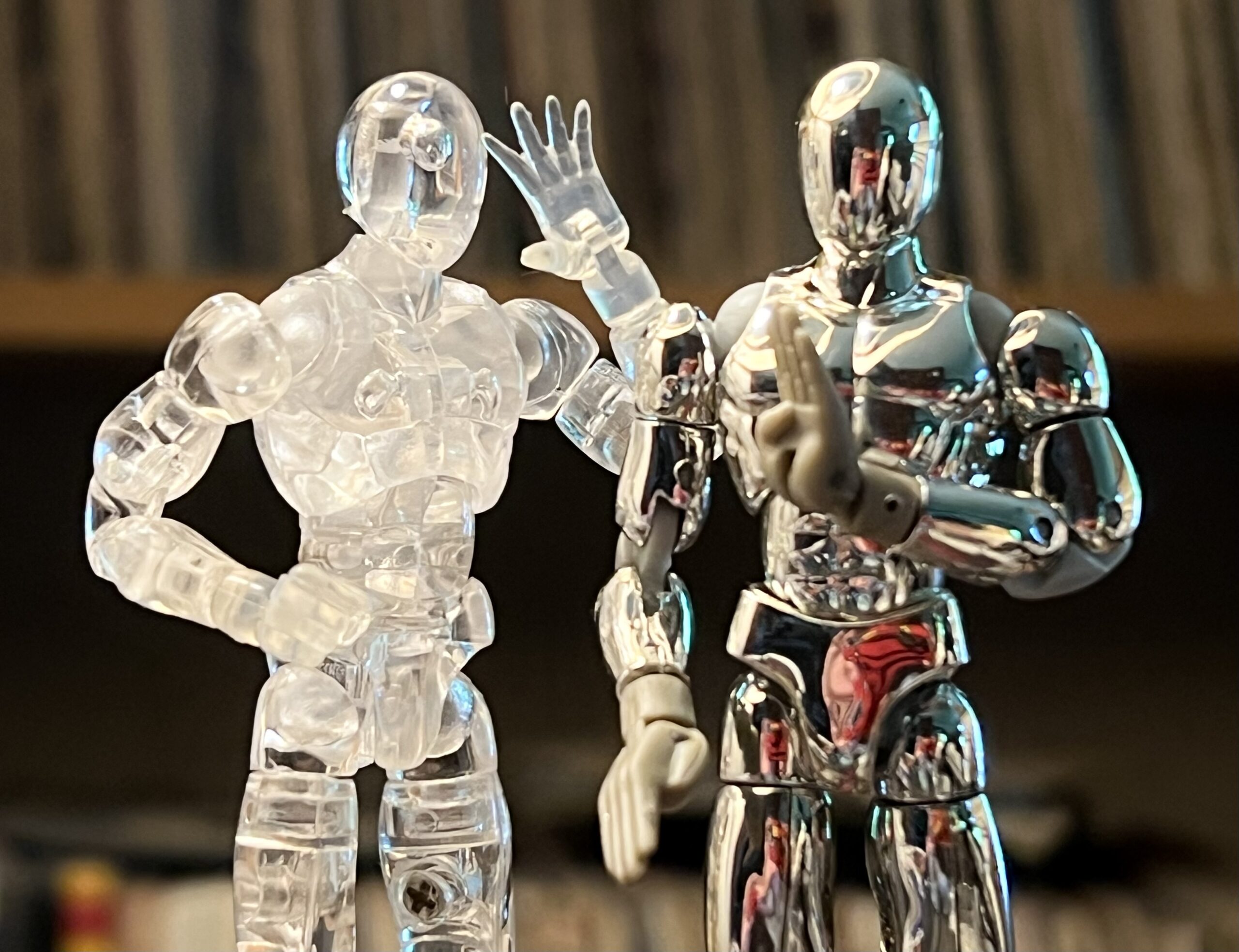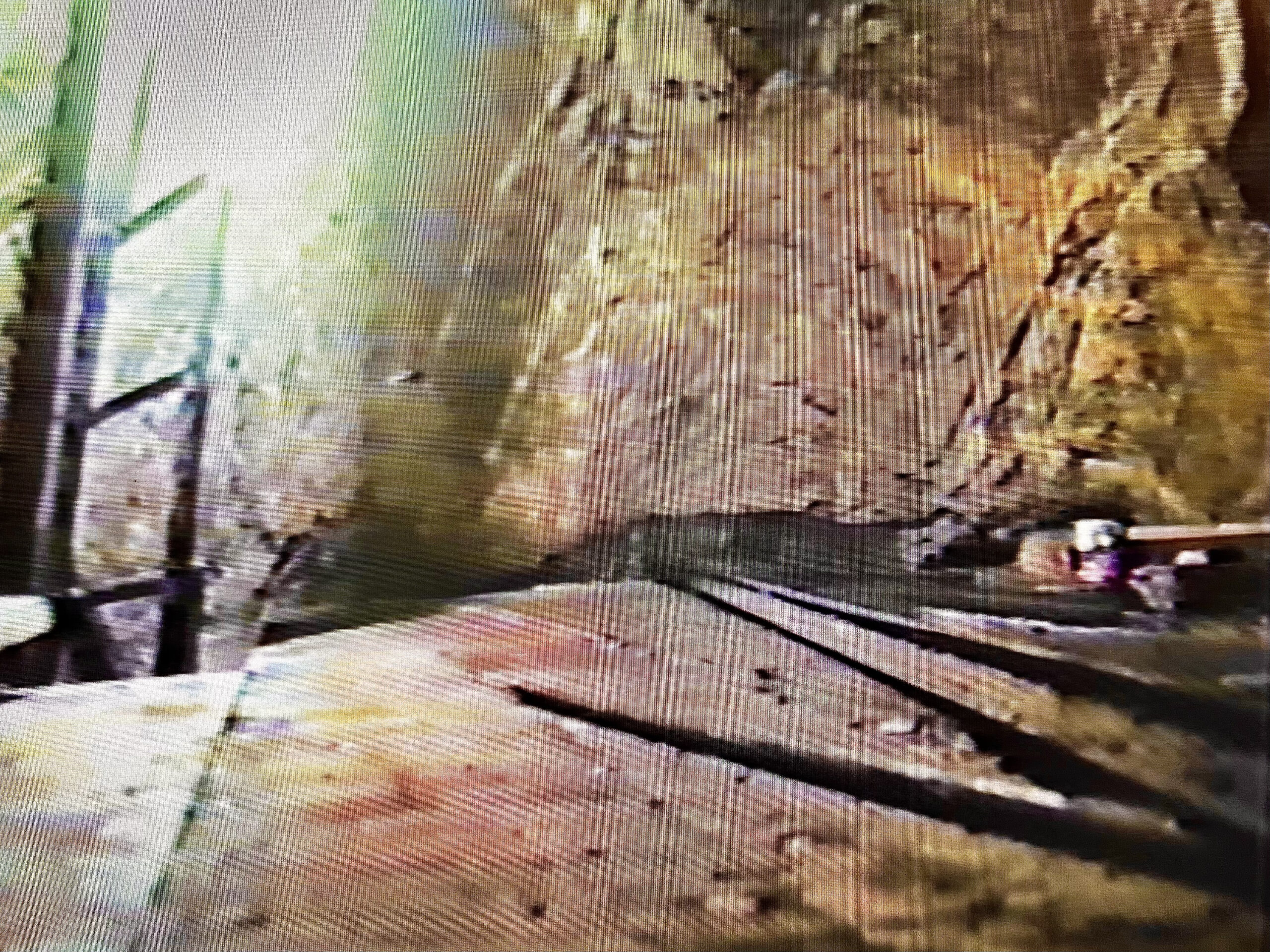You can also download this selection as a PDF.
Grab Your Coat and Hat, There Will Soon Be Nothing Left Here
Keeping An Eye on L. M. Fish as He Surveys Eureka, California, 1947
Cliffside, a lumberjack in apprentice suspenders, Lieber
Fish struggles to judge the distance between the tip
of his nose and a gull suspended in mid-air,
its head held against the sea-breeze: California
holds the bird back-as a great aunt might-overruling its flight-path,
the soil passed and passing to the sea, alluvial
granite moseying westward along a wet
avenue. And, look, he is a prince of the morning:
Goodman Fish loiters just outside the gallery of old-growth
oaks and Redwoods that lean out toward the trudging
distant seagull-how far he is from Back East. The West,
the frontier, its horizon a whip-stitched halo
of atmosphere: nitrogen, oxygen. This diocese of noble
gases reaches for the grande dame Pacific and east
a-ways, across Piedmont, into his native
Georgia; how far Fish seems-the prongs of his logrolling
caulks dug into Her spine like riding-boots, as if she could buck.
Materfamilias up and down the knackered seaboard,
these outskirts of Columbia, America
fallen and falling in: there are, perhaps, eighteen
or twenty feet between him and the gull-which sweeps through the gust
as a pendulum, as the shade of a sundial-less
if counting the soil eroded, the lost ground, tokens
of the New World run away deep into the Old.
Seven Stanzas with the Weight of Water in Mind
In Oregon, Mr. Fish Reclaims Land from the Sea, 1948
The snowmelt is now pooling so keenly
around the mouth of the Coquille River
that, at a coastal pumping station,
I bear most of my goatish frame down upon
this stock-still lever–Watch for my profile,
cast against the delta basin, a day laborer
knuckling into the pumphouse waterworks,
just as a misarranged alphabet of Dusky Grouse
is typeset into the late winter sky.
I bring to mind the frigid meltwater from upriver
and it turns in my temples, turns open
the spotted cockleshells at river’s edge,
turns the paddlewheel of a seagoing steamship
on its axle–Look for my signal, for the sternwheeler
Astoria to pass safely by, and see it dock
at the hazelnut cannery across the way. Look
for me, from the lantern room of the distant listless
lighthouse, and I promise to throw my silhouette
so that even in the sleep-laden night snow, the flywheel
will catch and you will see we are high-and-dry,
the pinewood fishingboats upturned on the shore.
Take Care, I Want You to Take Care
1953: Mr. Fish at Sheepshead Bay
Into pebble-paved alleyways
and out from the underpasses,
I come in my coat-tails
to stride alongside you,
seeking what you are seeking:
lower Brooklyn–in goldtone,
at first light–by the waterfront
trolley line. From a high
summer footbridge, you give
audience to the harbor, the tidewater.
Lines Written On the Brink of the Lower East Side
L. M. Fish at the Edge of a Thundershower, 1960
Gone is the cascading light of day
that echoed hours ago
from windowpane to windowpane
in the long downtown afternoon,
displaced by the thunderhead angling
overhead–with its broad beclouded
crown–sidling over those of us
who lean from our brownstone
flats to meet 14th Street in honest
leisure. I think to tap my meerschaum
pipe over the sidewalk below,
the street clock nodding off at half-past
five–then there is an arc of light
in the distant clarity at the storm’s edge,
perhaps two hundred feet as the crow flies,
no more–I ought to photograph
the skyscrapers in these final moments
of June daylight, catching the farthest
edge of the fleeting sunshower
in sepiatone. I am forever free
to stand at the window–as I please,
with arms folded inward–the cityscape
small and isolated at the brink
of rainfall: knowable, personal.
At the first mumbling of thunder,
I throw a leg over my window ledge
and edge slowly closer–far below, the City
darkens–at street-level, only an abbess
strolls past, in dusky habit, as thunderstuck
Manhattan bristles at my cheekbones.
Poem Like an Instamatic Camera
Mr. Fish, 42nd Street & Lexington Avenue, 1965
He has never photographed himself outside their brownstone, but how about now,
winding the spring of his pocket-camera
while curbside, sidling
the lunchtime clamor
at The Chrysler Building:
What about here,
in all of this uncertainty?
How about, instead, walking the boulevards of the far-flung boroughs for a picture
with the clocktower of Ozone Park, Queens, or Staten
Island’s convincing
little roadside
Revolutionary
War monuments?
No, he clicks Shutter Release.
This is for Janine, he mumbles into the lens snapping above him. That will
be a reminder without their mistakes. He smirks
up toward the glassy
plane of The Chrysler
Building, and up into
the refracted light
from his flashbulb, into his lens
and he poses in the city: Here is his face with the sunken eyes and here
are his overcoat and loose jawbone, and his lips
read Hold the mayonnaise.
Here, Fish looks into
the rangefinder, exposes
the film again
to midday, and he was there.
To Persevere is to Draw Breath After Breath After Breath
L. M. Fish Frets for Three Blocks, Thompson Street, NYC
Within the cavity of my chest is a little pith,
a cystic bundle woven airtight and tucked
under the base of my windpipe, nestling amid two
lobes of lung–
it seems to be a knot, a gradual aggregation
of worry and bother: the burl teased from a bolt of tweed,
its weft and warp disarranged. This is my
most lovesome valuable, this coarse self-made
curio–
a lump, a deep-sewn attaché that I will always carry
on my stroll from the free-lunch counters of Bleecker Street up
to Washington Square Park, just as I do
now. I take to my feet, which swing to measure my tempo against
the city–
two metronomes sounding my internal Standard Time to all
of Greenwich Village and to its galleries of watchmakers
and clock-masters. From here, I can nearly see
the Village Gate and its understratum of busted-up
double reeds–
under its floorboards, I would imagine, there is stored
a tone of such intimate length and depth, almost like a bass
trombone, or like hearing your mother cough
from one end of the house to the other. I no longer have
the patience–
there is, between she and I, a little cluster of tissue
that in the long mid-day hours has swelled to a medallion
of fat. There is a knot caught in her throat,
and as she pauses, I feel for the underside of my fatigued
diaphragm–
she holds my hand, and I hold my chest and we suffer.
My Wife as One of Many Mammals
A Sketch of Missus Fish, 1966
Hush-the play of lights, of common
daylight and early evening
owl-light, is pitched onto
her knees,
against the palm of the Empire
sofa-our windows thrown open
to Stanton Street, bamboo shades
half-drawn
to dim the avenue and dull
its hustle-bustle-hush. Soundless,
Janine slumbers, her child snoozing
inside.
They should be fashioned in marble,
here: her stock-still chin cordially
stippled from stone, a keen bright
chisel
tunneling for unborn promise.
O! what a scene to study upon
waking every day, for months–but
hush–hush.
It seems too much: the quietness
demanded by pregnancy, waiting
for soft entrance-the twilight now
a dark
gown-mother-and-child at rest,
iced over, unmoving, breathing
like two petite beasts-one within
one more.
Twenty-Eighth Street, Kindly Allow Me to Fish God & the Virgin from Your Depths
from a line in “The Work” by Dana Levin
You can feel it, the city, constant around you: my cufflinks
skittery from more than a half-block of jackhammering. It must be
said, I must say that my initials are not immediately
apparent-oh, 28th Street is crumbling-on these fine
monogrammed cufflinks, and I have been solicited to join the Order
of Carmelites on fine linen writing-paper. My fawn-gentle fingers
seize upon the vibrating envelope in my pocket, guilty-like being
the one left holding a pistol after a fist-fight-guilty for half-a-mile’s
walk from the bus to Our Lady of the Scapular. You can feel it, the Holy
and Apostolic See, constant around you; and yet, it seems preoccupied.
Even in Midtown, they sometimes bow in prayer-Gloria Patri-my own
finger-bones half a tick behind the springs of a street clock beside
the Congregation Adereth El. Someone should mention, in whispers,
to the Reverend Father that I am at least half-Judaic-You can
feel it, they might say after showing me out-and that is what I mean
by guilt: never knowing. Never being able to know enough to help,
though kindness need be everywhere: the city, constant around you–Hear,
O Israel, and Glory be-in this parish of chantry-chapels.
The breath of a young lily settles near the church-door: Our Lady
travels in a circuit from rooftop to rooftop, in oscillation,
an alternating current distributed to the very poor–You can
feel it, I imagine the dispossessed would insist, but not like our city.The especially hungry should, instead, say that they do not know the Blessed
Virgin and the God of Israel as others do: for they can know God without
knowing the acquaintance of His grace. I can imagine it would be like smelling
perfume–Shalimar, let’s say, or black pepper with tomato–while waiting
alone at mid-day in a bus shelter. But I cannot know for certain. I’m left standing
at the church door, my envelope folded in-two, a pocket in my pocket:
I commit to memory the shape of my embossed name and the grain of the letterhead,
propping their invitation against the doorstep, never giving them the chance.
Lipping Chocolate Cigarettes, the Mathematician Shakes a Fist
Waking to a thunderclap un-tethered over the Ionian
Sea, I button my snoring trousers, windstorms raising a caterwaul
from the east-I am navigating the Earth’s equatorial
cummerbund. Inside, my porthole depicts an ocean awash
in Cinecolor: its greens dampened by the hurry-scurry of rainfall-and I,
elephantine in my cabin, imagine myself seaside
with Archimedes at Syracuse-Archimedes and I laying
in the surf, gowned and noshing Walnettos, malted milk balls
and licorice pipes-we weigh upon the Sicilian
coast like a pair of elderly Monk seals: he, drawing a triangle
in the sand, and around that a curving parabola, an arch-and I,
tracing within his, a scalene triangle of my
own, and then he within mine, until sand and reeds seem
no longer delicate enough-inadequate for inscribing even one
granule with further figures and arcs; he, confounded
by the divisibility of sand into atoms-and further,
farther-Archimedes as a host for molecules, quarks, antiquarks
and nucleons: he gives me the eye-more-or-less John
Wayne at the corners of his mouth, snarling, the mathemagician
divides an envelope of Sen-Sen breath powder in two
and into fourths, and onward: his palm a boundless quarry,
each finger a jointed crane-I watch his sleight-of-hand
with care, Archimedes crafting dozens of hand-cradled piles
from the confection-breaking each mint fleck into smidgens
and smidgens into specks, specks into trifling jots
of sweet starch-his hand thrown into routine as though sliding
the beads of a school’s abacus, east to west-only
a fine dust remains, an indivisible hodge-podge: chuffed,
Archimedes turns and strolls the beach to dry his gown,
and that is the precise distance between ancient
and modern-O!, rocket-ships, O!, vulcanized rubber.
Navigating by Echocardiogram, 1968
In which He is Plunged into the Sea
L. M. Fish lies anaesthetized,
the skin of the chest peeled
back as to permit entry
to the crestfallen monarchy
of his cardiac organs–stretched
across an operating table, as stiff
as a saint’s finger-bone–grand
mal bedeviled by the assembly
of surgeons that carve from his fractured
ribs a seascape of curling, red-tipped
whitecaps–this fleshy tide rises
and falls with each kick
of his mule-legged heart–outer
walls swabbed sinless, continents of fat
bathed in antiseptic; the muscular
Sergeant-at-Arms laid out, guileless,
simple, a waxing gibbous
moon–roundabout, the operating
theater unable to contain Mister Fish
in his most holy of holy forms:
gentleman caller to the Lunar
Mansion, that colossal magnet–Fish
falls away from Her, hovering
fixed above the Pacific Basin,
its ground swells soaking
the machine-sewn hem of his surgical
drape, the sea a mimeographed portrait
of Magellan: blustery–L. M.
is ensnared by the algal bloom
of the circumnavigator’s whiskers,
and lowered, lowered until the value
of Her coin-like face passes
into an illegible hodgepodge of glowing.
The patient’s chest cavity fills
with brine and, immersed, floating mildly
toward Manila; farther westward
and into the path of the Tet
Offensive–tumbling along the peaks
of seamounts–She, unable
to hesitate, draws a tidal current over him,
a submarine river that presses
his displacement–obliged by Her
magnetic thrust–soon, his heart
will be restarted, and, the sutures
will keep him whole, and, Fish is sewn
from east to west–Oriental
to Occidental–lungs aerated,
blood siphoned-in to satiate
the aorta, rambling through
the four chambers, rambling when called.
Birdcall, I First Hear Birdcall from the Fragrant Magnolias
Janine L. Fish Waits for Dawn in West Florida, 1979
I can’t forget that once I crossed myself alone
at the sign of first-light: I prayed
as the hard freeze withdrew inland, as two columns
of daytime ran parallel to the hallway
floorboards, the paper-backed vanity mirror
holding me upright, I waited in goosebumps.
Before sun-up, I prayed a prayer to hear
birdsong, to hear what the aimless
kingfisher had to say as he sashayed
to wake his mate nesting in the sea grass.
What else can the faithless do? I settle now
for the clacking yelp of the herring gull
that pitterpats her clawed toes along the frosted
gutter pipe and, my hair dressed and tangle-free,
I think of dabbing the scar tissue atop Leiber’s
breastbone with lanolin, and the new morning
carries the aroma of open magnolia blooms
and a winnowing of Bluebirds’ wings.
I do believe that I once crossed myself
alone and at the sign of first-light;
this is saying that I tried to take care of him,
this says I could only ever do so much.
For seven weeks, I have left the screen door unhinged,
our sleeping-porch cold, anxious, open.
Madsong Concerto for String Duet
Eyelids touching, well-met,
I am dead-tired of marching
inward only to overlook
myself. Of late,
at sixty-two, I’m starved
for song: My dear, forget.
Janine, let me pass for jest,
as meshuggeneh,
your idling bridegroom.
In my crooked
waistcoat, maddened
to sing: My dear, forget.
Put me aside. In repose,
I hum to fill the margins
of your prayerbook
with boughs of oak,
to take my place, singing:
My dear, dear, forget me.
How Loquacious the Quiet Can Be, How Endless
1981: Sitting With His Daughter Clementine, Lieber Fish Thinks of Something to Say
Each year is endured
at such a loss, is what I could respond,
but don’t–you were telling me how most people
would like for the Cold War to be over,
but–I don’t know. We’ve suffered a loss,
too, you and me.
The kitchen faucet
snarls while you wait for me to speak.
Under the sunshade of noiselessness that we’ve
hung here–among the mid-day gibberish–our teatime
is interrupted in mid-sentence, at this table,
in mid-air.
I watch your jawbone
come to rest, the oatmeal cloth curtains part
with the breeze and we think of what people
will say in days to come, about the nearly
silent day we spent together–though I
don’t think long.
Ars Poetica in Bottle Glass and Seawater
L. M. Fish at Carrabelle, in the Panhandle of Florida, 1984
Stretching his bird-thin limbs,
Fish thinks it a shame
that the pleasure of sleeping
is an unconscious joy:
a dip of the eyebrows
beneath the nightlong sea-foam
or like a prolonged moment of losing
one’s words, what to call this
or that. He has propped each
window open to receive
the westbound doldrums of autumn
that sweep over the cinderblock homes
at Carrabelle, and thinks of the heavens
above the Earth as a star-burnt
cavity, of the abandoned
Mojave Desert, that in dreaming
he could attend to the airy unstudied
spaces around his thoughts. Fish
recalls, tightening his eyelids,
the peach-toned sea glass
shards that filled a jar on a piano lid,
remembers them in his great-aunt’s
sun parlor, thinks of lamp light falling
across the raised letters that spell
Amb-erg-ris or In-dian
Ink or Tinct-ure, their marks
of manufacture. He must know
that every serif of those four
lost words was smoothed in time
by a groundswell pressing
upon the seafloor, and that the dreamful
heavens hung overtop the Earth draw
the tide: whispering the hours, one
comes to depend on the other,
ink-stained and wave-worn.
M. Reed Corey is a Ph.D. student in the Program for Writers at the University of Illinois at Chicago, where he also teaches courses in poetry and nonfiction composition. A native of Neptune Beach, Florida, Corey is a winner of the 2007 AWP Intro Journals Project Award and serves as Co-Editor-in-Chief of Packingtown Review.


